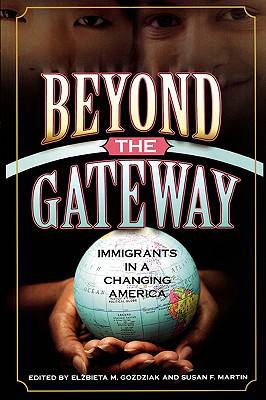
Bedankt voor het vertrouwen het afgelopen jaar! Om jou te bedanken bieden we GRATIS verzending (in België) aan op alles gedurende de hele maand januari.
- Afhalen na 1 uur in een winkel met voorraad
- In januari gratis thuislevering in België
- Ruim aanbod met 7 miljoen producten
Bedankt voor het vertrouwen het afgelopen jaar! Om jou te bedanken bieden we GRATIS verzending (in België) aan op alles gedurende de hele maand januari.
- Afhalen na 1 uur in een winkel met voorraad
- In januari gratis thuislevering in België
- Ruim aanbod met 7 miljoen producten
Zoeken
Beyond the Gateway
Immigrants in a Changing America
€ 85,45
+ 170 punten
Omschrijving
A small but growing number of immigrants today are moving into new settlement areas, such as Winchester, Va., Greensboro, N.C., and Salt Lake City, Utah, that lack a tradition of accepting newcomers. Just as the process is difficult and distressing for the immigrants, it is likewise a significant cause of stress for the regions in which they settle. Long homogeneous communities experience overnight changes in their populations and in the demands placed on schools, housing, law enforcement, social services, and other aspects of infrastructure. Institutions have not been well prepared to cope. Local governments have not had any significant experience with newcomers and nongovernmental organizations have been overburdened or simply nonexistent. There has been a substantial amount of discussion about these new settlement areas during the past decade, but relatively little systematic examination of the effects of immigration or the policy and programmatic responses to it. New Immigrant Communities is the first effort to bridge the gaps in communication not only between the immigrants and the institutions with which they interact, but also among diverse communities across the United States dealing with the same stresses but ignorant of each others' responses, whether successes or failures.
Specificaties
Betrokkenen
- Uitgeverij:
Inhoud
- Aantal bladzijden:
- 312
- Taal:
- Engels
- Reeks:
Eigenschappen
- Productcode (EAN):
- 9780739106365
- Verschijningsdatum:
- 1/05/2005
- Uitvoering:
- Paperback
- Formaat:
- Trade paperback (VS)
- Afmetingen:
- 155 mm x 227 mm
- Gewicht:
- 403 g

Alleen bij Standaard Boekhandel
+ 170 punten op je klantenkaart van Standaard Boekhandel
Beoordelingen
We publiceren alleen reviews die voldoen aan de voorwaarden voor reviews. Bekijk onze voorwaarden voor reviews.








